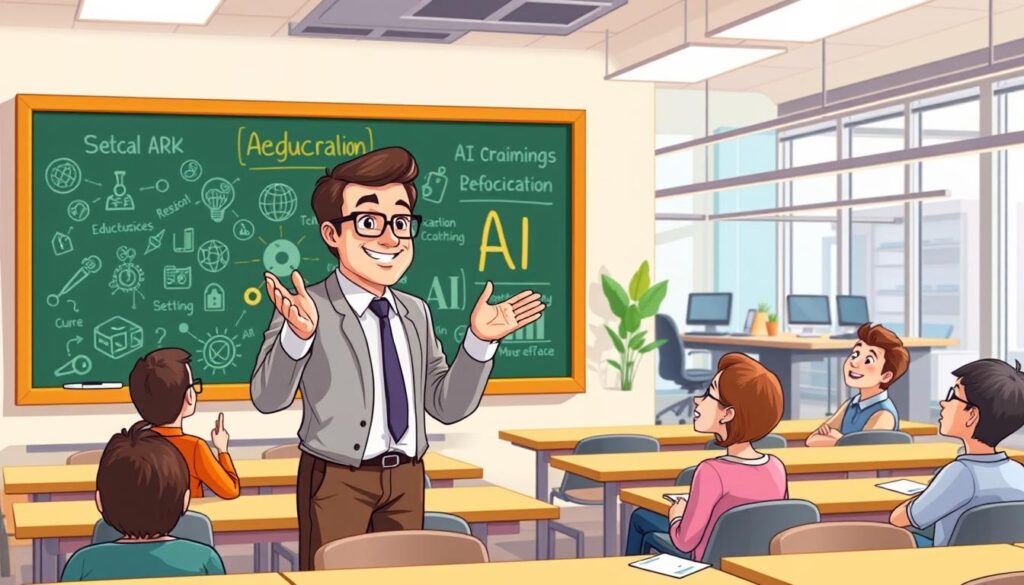Are you passionate about education and eager to explore the cutting-edge world of AI? Becoming an AI educator offers a unique opportunity to inspire others while staying at the forefront of technological innovation. In this evolving field, educators play a crucial role in shaping how AI is integrated into schools and training programs.
Leading AI-focused workshops allows you to share your expertise and empower others with the skills they need to thrive in a tech-driven world. These workshops are designed to be engaging and interactive, helping participants transition from traditional methods to AI-enhanced approaches. The goal is to create a seamless learning experience that fosters creativity and adaptability.
With the demand for AI-savvy educators on the rise, now is the perfect time to enhance your professional profile. By embracing a course designed for modern educators, you can gain the insights needed to transform classroom experiences. This section will guide you through the opportunities, benefits, and practical steps to succeed as an AI educator.
Introduction to Becoming an AI Educator
Imagine shaping the future of learning by integrating cutting-edge technology into classrooms. As an educator, you have the unique opportunity to lead this transformation. By embracing AI tools, you can create personalized learning experiences that captivate students and enhance their academic growth.
Understanding Your New Role in AI Education
Your role as an AI educator is pivotal. You’ll guide students through interactive and adaptive learning experiences, making complex concepts more accessible. Tools like ChatGPT empower you to tailor lessons to individual needs, fostering creativity and critical thinking in the classroom.
Current Trends and Opportunities in AI for Educators
AI is revolutionizing education, offering innovative ways to engage students. With a free 2-hour course on using ChatGPT, you can gain practical strategies to introduce AI in your classroom seamlessly. This course, designed for educators like you, provides insights into creating self-paced digital resources that enhance learning experiences.
By integrating AI, you not only benefit your students but also revitalize traditional teaching methods. This approach ensures that your classroom remains dynamic and responsive to the evolving needs of your students.
Benefits of Teaching AI Workshops
Discover how leading AI-focused workshops can transform both your teaching methods and student outcomes. By integrating innovative educational resources, you can create a more dynamic and engaging learning environment.
Enhancing Classroom Learning and Engagement
AI workshops introduce cutting-edge tools that make learning interactive and personalized. These resources empower students to explore complex concepts in a hands-on way, fostering creativity and critical thinking. For instance, AI-powered simulations can bring abstract ideas to life, making them easier to understand and engage with.

By aligning AI-driven strategies with your classroom goals, you create a tailored learning experience. This approach not only boosts student engagement but also ensures that each learner progresses at their own pace.
Optimizing Lesson Planning with AI Tools
One of the most significant advantages of AI in education is its ability to save time. Smart AI strategies streamline lesson planning, allowing you to focus on what matters most—teaching. Tools like prompt libraries can help you prepare engaging materials quickly and efficiently.
Moreover, AI can analyze student performance data, identifying areas where additional support is needed. This insight enables you to adjust your teaching strategies, ensuring that no student is left behind. By continuously refining your approach, you can enhance both teaching practices and student outcomes.
With AI, you’re not just saving time—you’re creating a more effective and adaptive learning environment.
Essential Tools and Strategies for AI Educators
Equipping yourself with the right tools and strategies is crucial for effective AI integration in education. Discover how innovative technology can transform your teaching methods and enhance student engagement.
Leveraging Innovative Technology in Your Classroom
Modern educators rely on a variety of tools to streamline tasks and enrich learning experiences. For instance, AI-powered platforms like Eduaide.AI offer over 100 resource types, from lesson plans to activities, all accessible through simple keyword prompts. These tools not only save time but also allow for instant content translation into multiple languages, making them invaluable for diverse classrooms.

Additionally, tools like Quizizz use AI to adjust question difficulty based on student responses, creating personalized learning paths. This adaptability ensures that each student is challenged appropriately, fostering a more dynamic learning environment.
Integrating AI Best Practices and Hands-On Learning
Blending theory with practice is key to mastering AI tools. The MagicSchool certification course offers hands-on sessions that guide you through step-by-step methods of AI integration. These sessions emphasize practical application, allowing you to refine advanced skills and apply them directly in your classroom.
By focusing on real-world examples and best practices, you can create interactive and engaging lessons that cater to all learning styles. This approach not only enhances instructional quality but also ensures that your teaching practices remain aligned with current educational trends.
Become an AI Educator: Teach Workshops and Get Paid to Share
Transform your passion for education into a rewarding career by designing impactful courses and structuring payment models that reflect your expertise. This section will guide you through creating personalized learning experiences and setting up sustainable workshop logistics.
Designing Impactful and Personalized Courses
Creating engaging courses starts with understanding your audience. School districts and individual schools have unique needs, so tailoring your lessons to these requirements is key. For example, a 45-minute back-to-school workshop can focus on AI resources that save teachers time, addressing a common pain point. By keeping the content focused—like sharing just one AI resource—you avoid overwhelming participants, ensuring they leave with actionable insights.
Structuring Payment Models and Workshop Logistics
Developing a fair payment structure is essential for sustainability. Consider offering tiered pricing or partnerships with school districts to make your workshops accessible. For instance, a 5-day lesson plan on iPad troubleshooting can be sold as a standalone course or bundled with other resources. This approach not only diversifies your revenue streams but also caters to different learning needs.
By focusing on practical applications and clear value, you can create courses that resonate with educators and districts alike. This balanced approach ensures your workshops are both educational and profitable, establishing you as a trusted resource in the education community.
Real Success Stories and Impactful Case Studies
Exploring real-world applications of AI in education can inspire your own teaching strategies. Let’s delve into practical examples where educators have successfully integrated AI tools, transforming their classrooms and student outcomes.
Practical Examples from AI-Driven Educational Settings
One notable example is Loyola University Chicago, which implemented an AI-powered digital assistant called LUie. This tool achieved an impressive 86% initial accuracy rate, rising to 91% over time, with 91% of students providing positive feedback. Such success stories serve as a guide for educators looking to adopt similar technologies.
In another instance, Bolton College reduced video production time by 80% using Synthesia’s AI platform, enabling them to create over 400 new videos in a year. These case studies highlight the effective way AI can streamline tasks and enhance educational resources, offering a clear blueprint for implementation.
By following these proven strategies, you can pave the way for meaningful improvements in your own teaching practices. These real-world examples provide a hands-on approach to understanding how AI can benefit your classroom, ensuring you’re well-guided on your journey to integrating innovative technologies.
Advancing Your Certification and Professional Growth
Take your career to the next level by exploring specialized certification programs designed for modern educators. These programs offer hands-on training, equipping you with the skills needed to integrate AI effectively in educational settings.
Exploring Certification Courses and AI Training Programs
Consider enrolling in programs like the MagicSchool Certification Courses, which provide a structured approach to AI integration. These courses range from foundational to advanced levels, offering practical, hands-on experiences that enhance your teaching strategies.
Expanding Your Network in School Districts and Communities
Leverage your certification to connect with other educators and school districts. Building a strong network can open doors to collaboration and new opportunities, helping you stay updated on the latest AI tools and methodologies.
By investing in your professional growth through these certifications and networks, you position yourself as a leader in the evolving field of AI education.
Conclusion
Your journey to becoming an AI educator is a path filled with opportunities to transform education. By embracing self-paced learning and continuous professional development, you can empower students with the skills needed for a tech-driven future. The strategies and success stories shared here provide a clear roadmap for integrating innovative tools and best practices into your teaching methods.
Remember, the key to success lies in taking actionable steps. Start by exploring certification programs and leveraging AI tools to create engaging, personalized learning experiences. Focus on practical applications and ethical considerations to ensure your efforts lead to meaningful, informed changes in the classroom.
As you move forward, stay committed to self-guided improvement and the progressive integration of technology. The future of education is in your hands, and with dedication, you can create a transformative learning environment that benefits both you and your students.
